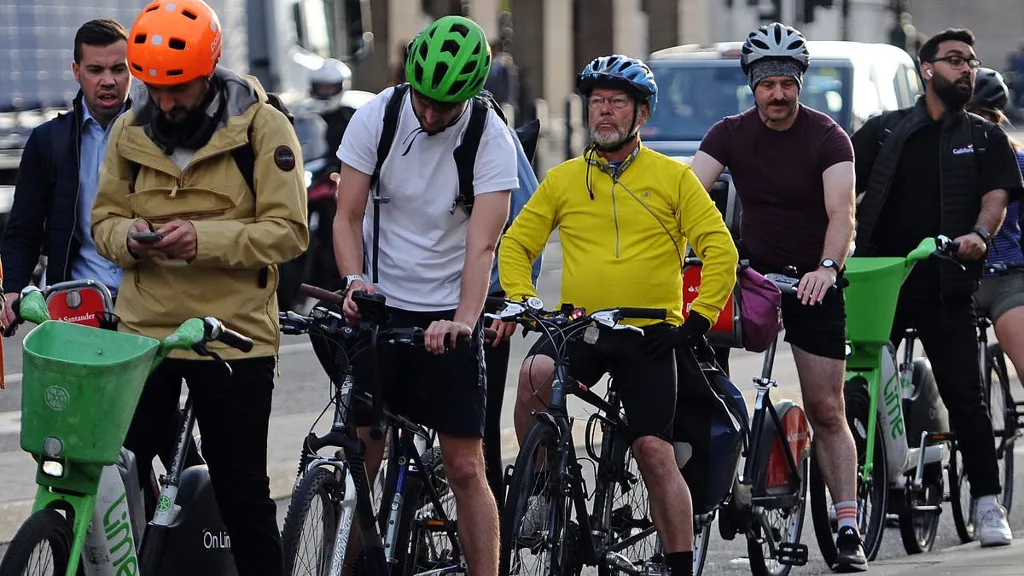Striking tube drivers sent the bike accident rate soaring as hard-working Londoners tried to beat the travel chaos by cycling to the office.
Collisions involving bicycles saw a 44 per cent spike this week after an RMT union walkout from Sunday evening to Friday morning.
Commuters turned to two wheels, with rental e-bike companies reporting a vast increase in users during the strikes, which brough Tube services to a halt.
The London Ambulance Service (LAS), which shared the statistics with The Times, encouraged cyclists and pedestrians to be 'extra careful on the busy roads'.
Cases of those on bikes taking unnecessary risks and even mounting onto pavements were seen across the capital, leading to more collisions.
The LAS added that it had been 'very busy' this week and was 'seeing more traffic on the roads, which means even ambulances on blue lights are taking longer to reach our sickest patients'.
Santander cycles, which are operated by Transport for London (TfL), saw users soar in number by 72 per cent, while customers of e-bike companies such as Lime, Forest and Voi also shot up.
Lime revealed a more than 50 per cent jump in trips during rush hour traffic on Monday and Tuesday.
The company, which operates rental e-bikes and e-scooters in towns and cities around the world, said people had been taking longer journeys this week.
On Monday between 7am and 11am, the total number of trips taken surged by 58 per cent compared with the same period the previous week.
The duration of trips rose by 37 per cent and distances increased by 24 per cent.
Momentum continued into Tuesday, where total trips increased by 50 per cent, while the duration surged by 41 per cent and distance rose by 28 per cent compared with the same period a week ago.
Hal Stevenson, Lime's UK and Ireland director of policy, said the data shows how London workers are using its bikes to 'plug the gaps left by public transport'.
'Journeys were longer in both distance and duration, indicating that many riders relied on Lime for their entire commute rather than just the first or last mile,' he said.
Lime has 'stepped up operations across the city' to meet the surge in demand, Mr Stevenson said.
'Our driver team has been on standby to keep vehicles in service, whether through fresh batteries or rebalancing overcrowded bays, and we are continuing to increase foot patrols in central London to keep high-demand areas clear.'
The City of London Corporation recently launched a crackdown in response to a number of complaints about e-bikes being left in unsuitable places.
The local authority said in February that more than 100 that were blocking pavements had been seized during a two-week operation.
It comes after experts claimed that driverless trains could be the solution to avoiding more Underground strikes, as Sir Sadiq Khan was accused of being 'completely absent'.
Mr Khan's Tory opponents accused him of 'abdicating his fundamental duty' and claimed he had been 'nowhere to be seen' during the transport crisis.
No talks are planned to try to resolve the ongoing dispute over pay and hours, with the RMT also claiming that its strikes could target the Elizabeth line next.
Eddie Dempsey, the RMT general secretary, called on the Mayor of London to hold a summit with the union in a bid to end the misery being inflicted on hard-working Brits.
Speaking at the TUC Congress in Brighton on Wednesday, Mr Dempsey told delegates: 'I've got a message for the mayor. Instead of going on social media, instead of the old tired cliches, telling trades unionists to get round the table, you're the Mayor of London, you're the chair of Transport for London.'
'Stop going on social media, invite us to the meeting, let's have a discussion, because I want to know what is going on in London.'
As the strikes rumble on, academics have been making a renewed case for driverless trains on all lines, mirroring the Docklands Light Railway which launched without drivers in 1987.
The Conservatives have backed driverless Tubes for years but the idea has faced staunch opposition from the powerful railway unions amid safety concerns.
Boris Johnson said back in 2020 when he was prime minister that driverless trains should be a condition of any future funding for Transport for London (TfL).
Grant Shapps also told TfL to look into the feasibility of driverless trains in 2022 after the Department for Transport bailed out TfL during the Covid-19 pandemic.
But TfL believes such a project would cost billions of pounds to implement - including £20billion on just three of the oldest lines. Mayor Sir Sadiq Khan said last December that work to introduce driverless trains would 'not be progressed any further'.
The Centre for Economics and Business Research estimates the strike had a direct impact on the London economy of £230million and cost millions more indirectly.
Jawad Iqbal, former visiting senior fellow in the Institute of Global Affairs at the London School of Economics, told The Times: 'This reckless industrial action can only hasten public demands for driverless trains.'
He added: 'Automation would do wonders for economic productivity and would help bring an end to damaging disputes of this nature. No modern capital city should be held to ransom in this way.'
'The RMT, a union dinosaur unable to adapt to a changing world, has only itself to blame. Its members will unfortunately pay the price in terms of their jobs in the long run. The public won't mourn their demise.'
